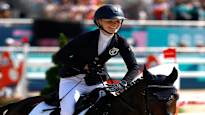Paris Olympics on channels 26.7.–11.8. Go to the competition website here. You can find the entire program of the games here.
“Today we’re going to show what we can do and have fun on the track.”
Field rider Veera Manninen believes that inner speech is of great importance for successful performance. Inner speech refers to the conversation that everyone has with themselves in their minds.
Manninen thinks that the horse also seems to hear his thoughts.
– It is really important that the inner speech is cheerful, especially with horses. A horse can sense what mood its rider is in, Manninen says.
Inner speech can influence what you focus on, says the sports psychologist of the Finnish Olympic team Tiina Röning. When a person is in an exciting situation, the brain sensitively produces threat and disaster speech. In terms of sports performance, it is harmful.
– The mind is like a popcorn machine: it produces hundreds of thoughts, most of which are not very binary. Internal speech can replace the stream of consciousness with more effective thoughts, says Röning.
With inner speech, an athlete can also influence the state of alertness and emotional state in which they start the performance. Both contribute to success.
“I get a lot out of failures and I rarely make the same mistake again.
field rider Veera Manninen
Veera Manninen uses inner speech both during training and on competition days. He focuses on cooperation with the horse in the saddle: what he is doing at any given moment, and how the horse reacts. Before the obstacle, he may think that everything is fine and he can go to the obstacle calmly.
An encouraging tone is maintained, even if everything does not go as expected. Then Manninen can think, for example, “it’s okay, let’s move on.” Cross-country riding is such a fast-paced sport that you can’t stop thinking about it. If they get caught, it affects the horse and the performance.
Failures teach
Manninen has never had a psychic coach. He has learned to regulate his emotions and use his inner speech through experience.
24-year-old Manninen has been riding all his life. The riding instructor’s daughter started competing in dressage classes when she was under school age and progressed to the junior national team in cross country riding at the age of 13.
As a child, Manninen could cry over failures and find them insurmountable. However, every competition has taught me to be kind to myself.
It has required countless repetitions to learn to see the good moments even in weaker performances. When the competition performance is over, Manninen structures it very quickly in his mind.
What went well, and what could be done better next time? He may remember a failed riding line from a single track even years from now, but it doesn’t feel like a burden.
– I get a lot out of failures and I rarely make the same mistake again.
When Manninen, through the national team, has been able to attend lectures on psychological preparation, he has already realized that he is using many lessons. With age, mental preparation has become more conscious.
According to Tiina Röning, many competitive athletes have acquired good psychological skills already in childhood and youth. At the top level, psychological coaching often focuses on customizing methods according to the athlete and the sport.
Röning’s mission is also to offer athletes a place where they can release their everyday worries.
Like any competition
Competing in the Olympics is the highest career goal for many athletes. Still, Manninen prepared for Paris like any other competition. He did not take advantage of the opportunities offered by the team for mental training, because adopting new operating models right before the games could have mixed things up.
Mannine’s and gelding Sir Greg’s races in Paris resulted in 36th place. Especially the obstacle test went excellently and the two crossed all the obstacles cleanly. Deduction points from the exam were 1.20.
The off-road test also went well, when all obstacles were passed without mistakes. However, time penalties brought reductions of 18.40 points.
In the school test, the deduction points were 36.80: the horse had heated up by the time he entered the arena and was a little tense.
The total deduction points came to 56.40, but the overall picture of the Olympic debut remained positive.
See Manninen’s and Sir Greg’s performances from the Paris Olympics below:
